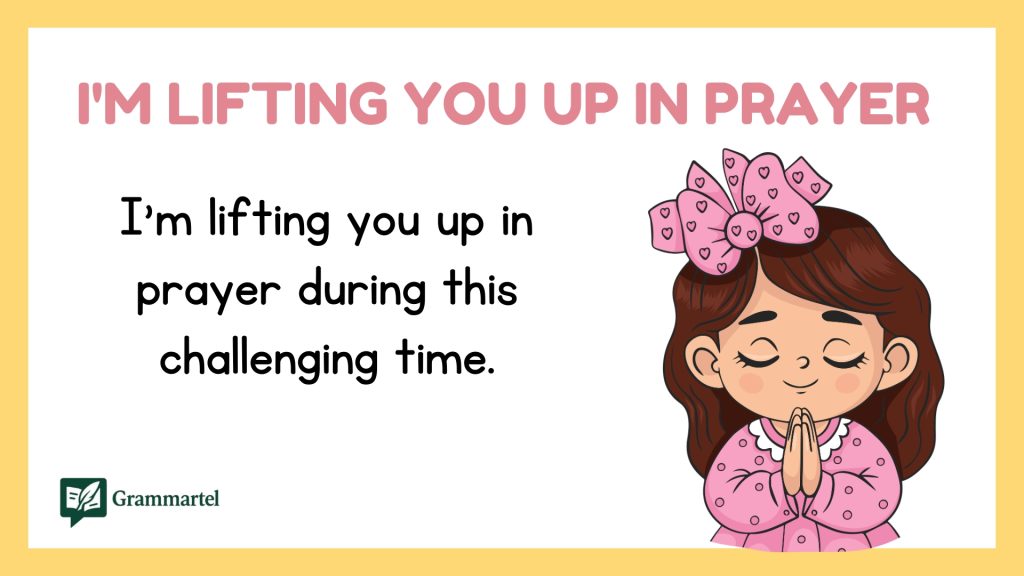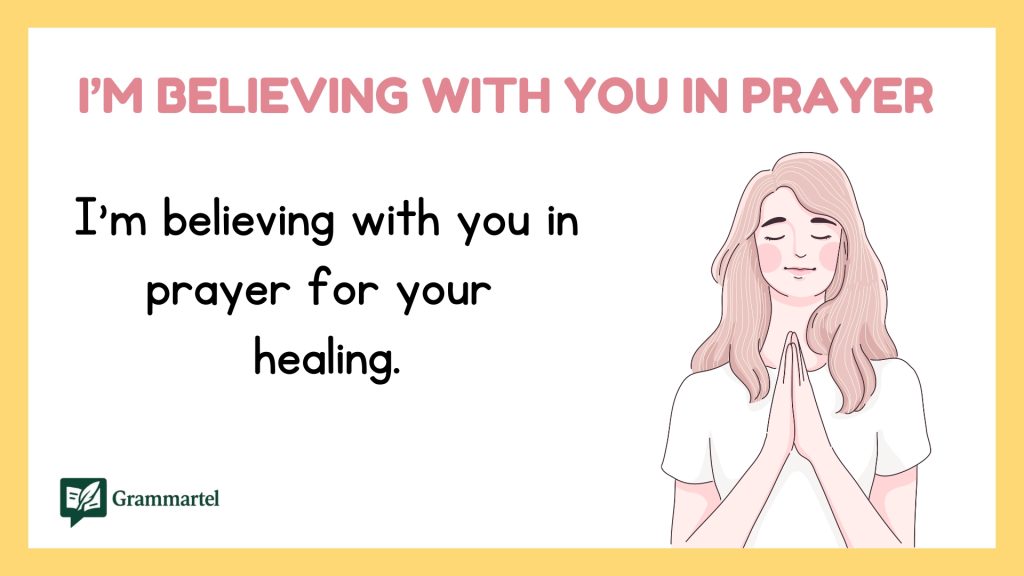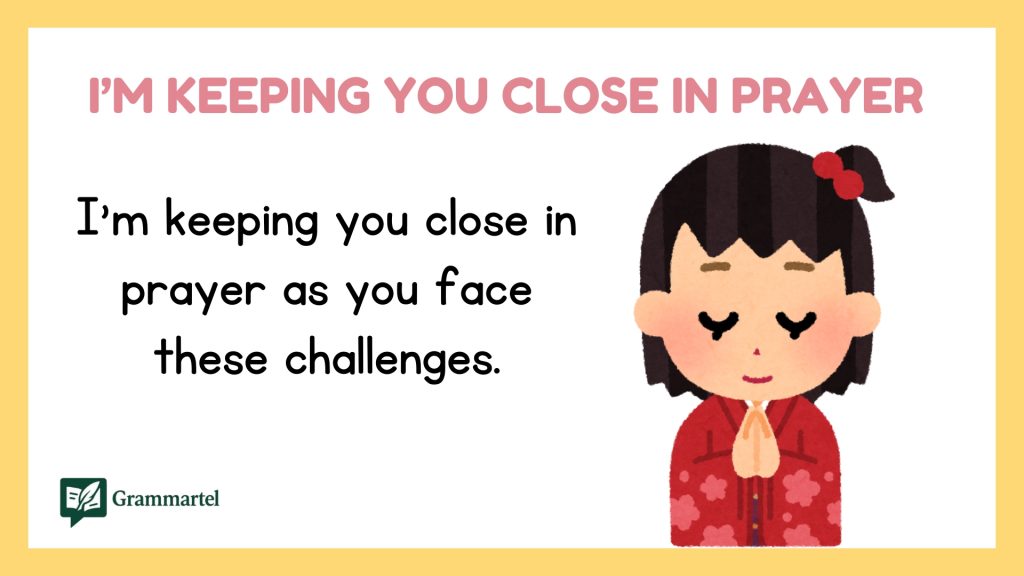When someone is going through a tough time, offering support is one of the kindest things you can do. While saying “I am praying for you” is comforting, there are many heartfelt alternatives to express your care and encouragement. These phrases can help show your empathy, love, and willingness to stand by them during difficult moments. Here are 40 meaningful ways to let someone know you’re thinking of them and offering your support.
What Does “I Am Praying for You” Mean?
When someone says, “I am praying for you,” it’s a heartfelt expression of support, often implying that they are offering their thoughts, prayers, or positive energy for your well-being. It can be a comforting gesture, showing empathy and a desire for healing or strength during tough times. The phrase can be used in many situations: when someone is ill, grieving, or going through a difficult personal challenge. It’s also appropriate during major life transitions, like job changes or moving to a new place, as a way to show care and encouragement.
When to Use “I Am Praying for You”
However, the phrase can also be used more broadly to express solidarity. It doesn’t always require a religious context—it’s about letting someone know you’re thinking of them and hoping for their best. Whether you’re praying in a spiritual sense or simply holding them in your thoughts, it can be a powerful reminder that others are with you, even if they’re not physically present. Just remember, it’s important to use the phrase sincerely and when you genuinely mean it.
40 Heartfelt Alternatives to Say “I Am Praying for You”
1. I’m Lifting You Up in Prayer

Meaning: Offering prayers for someone’s well-being.
Explanation: This phrase conveys that you’re actively praying for them and lifting their spirits to a higher power.
Example: “I’m lifting you up in prayer during this challenging time.”
Best Use: When someone is going through a tough time and you want to show support.
Worst Use: In a casual or non-serious context.
Tone: Supportive, sincere.
2. You’re in My Prayers
Meaning: You’re including someone in your daily prayers.
Explanation: A gentle way of expressing that you’re praying for someone’s health, success, or comfort.
Example: “You’re in my prayers as you go through this surgery.”
Best Use: When someone is facing a tough situation and needs encouragement.
Worst Use: In a situation where prayers are inappropriate, like a casual conversation about a trivial matter.
Tone: Thoughtful, caring.
3. I’ll Keep You in My Thoughts and Prayers
Meaning: Thinking about someone and praying for them.
Explanation: This phrase expresses both emotional and spiritual support.
Example: “I’ll keep you in my thoughts and prayers during your recovery.”
Best Use: When someone is experiencing a difficult time.
Worst Use: When you’re unsure whether the person is religious or appreciates prayer.
Tone: Compassionate, respectful.
4. I’m Holding You Up Before God
Meaning: Praying for someone with a deep, focused intention.
Explanation: This suggests you’re prayerfully supporting someone in a direct, intimate way with God.
Example: “I’m holding you up before God for your peace of mind.”
Best Use: When you want to express deep care and commitment to praying for someone.
Worst Use: In casual conversations or with someone who may not understand the depth of the phrase.
Tone: Serious, reverent.
5. I Am Asking God to Bless You
Meaning: You’re praying for divine blessings and protection for someone.
Explanation: This phrase is a way of invoking God’s blessings over someone’s life.
Example: “I am asking God to bless you as you move into this new chapter of life.”
Best Use: When someone is embarking on a new journey or facing a challenge.
Worst Use: For trivial situations or when the person may not share the same faith.
Tone: Warm, hopeful.
6. My Prayers Are With You
Meaning: Offering support through prayer.
Explanation: A straightforward expression of solidarity in prayer.
Example: “My prayers are with you as you face this tough decision.”
Best Use: When you want to provide spiritual comfort.
Worst Use: In a situation where prayer may feel out of place, like casual greetings.
Tone: Empathetic, kind.
7. I’m Sending Prayers Your Way
Meaning: Praying for someone and sending positive energy their way.
Explanation: Implies you’re actively sending prayers toward the person’s needs.
Example: “I’m sending prayers your way as you go through this loss.”
Best Use: When you want to offer your prayers in a heartfelt and personal way.
Worst Use: For minor issues where the person may not be seeking spiritual support.
Tone: Compassionate, caring.
8. I’ll Pray for Your Strength
Meaning: Offering prayers for someone’s resilience and inner strength.
Explanation: A specific type of prayer focused on helping someone remain strong.
Example: “I’ll pray for your strength as you face this health challenge.”
Best Use: When someone is dealing with hardship and needs encouragement.
Worst Use: When someone is not going through any challenges.
Tone: Encouraging, motivating.
9. You Have My Prayers
Meaning: You’re keeping someone in your thoughts and prayers.
Explanation: A supportive statement of prayer for the person’s situation.
Example: “You have my prayers for peace during this difficult time.”
Best Use: When you want to provide comfort without elaborating on the specifics of your prayer.
Worst Use: In casual situations or when prayer isn’t appropriate.
Tone: Warm, supportive.
You might also like : 40 Unique Ways to Say “Hidden Gem” (With Examples).
10. I’ll Keep You Covered in Prayer
Meaning: Ensuring someone is being prayed for regularly.
Explanation: This phrase suggests ongoing prayer, offering a sense of continuous spiritual protection.
Example: “I’ll keep you covered in prayer as you take on this new job.”
Best Use: When you want to reassure someone they are continuously in your thoughts and prayers.
Worst Use: For casual conversations or when the person may not value the sentiment.
Tone: Reassuring, thoughtful.
11. I’ll Be Praying for You Every Day
Meaning: Making a commitment to pray for someone daily.
Explanation: This conveys that you will be praying consistently for the person.
Example: “I’ll be praying for you every day during your recovery.”
Best Use: When someone is going through a prolonged struggle or health issue.
Worst Use: When it’s unclear if the person appreciates daily prayers.
Tone: Devoted, sincere.
12. I’m Praying for Peace and Comfort for You
Meaning: Praying specifically for emotional and spiritual peace.
Explanation: This phrase expresses a desire for the person to find comfort in their situation.
Example: “I’m praying for peace and comfort for you during this time of loss.”
Best Use: When someone is grieving or experiencing emotional turmoil.
Worst Use: When the person is not open to prayer or is in a casual setting.
Tone: Gentle, caring.
13. May God Strengthen You
Meaning: Asking for divine strength for someone’s struggles.
Explanation: This is a prayer for fortitude and courage during difficult times.
Example: “May God strengthen you as you face the challenges ahead.”
Best Use: When someone is facing adversity and needs encouragement.
Worst Use: In light or non-serious situations.
Tone: Encouraging, respectful.
14. I’m Believing with You in Prayer

Meaning: Praying alongside someone and believing that prayers will be answered.
Explanation: A collaborative prayer approach, emphasizing belief in shared prayer efforts.
Example: “I’m believing with you in prayer for your healing.”
Best Use: When someone is actively seeking prayers and you want to show support.
Worst Use: In a non-serious or casual context.
Tone: Faithful, collaborative.
15. I’ll Be Asking God to Help You
Meaning: Praying for divine intervention in someone’s life.
Explanation: Asking for God’s assistance and guidance for the person’s well-being.
Example: “I’ll be asking God to help you through your tough situation.”
Best Use: When someone is facing a challenge and you want to express genuine concern.
Worst Use: In trivial matters where the person isn’t seeking help.
Tone: Caring, genuine.
16. I’m Holding You in My Heart and Prayers
Meaning: Keeping someone in your thoughts and prayers, and emotionally supporting them.
Explanation: A phrase that conveys both emotional and spiritual support.
Example: “I’m holding you in my heart and prayers during your time of healing.”
Best Use: When someone is struggling emotionally or physically.
Worst Use: When you don’t have a close relationship with the person.
Tone: Loving, sincere.
17. I’m Asking for Divine Guidance for You
Meaning: Seeking God’s guidance for someone in a challenging decision or situation.
Explanation: A specific prayer for wisdom and clarity in tough choices.
Example: “I’m asking for divine guidance for you as you navigate this transition.”
Best Use: When someone is making an important life decision.
Worst Use: For trivial concerns that don’t involve big decisions.
Tone: Wise, thoughtful.
18. I’m Praying for God’s Will to Be Done in Your Life
Meaning: Praying that God’s plan unfolds in the person’s life.
Explanation: This prayer implies trust in divine providence and timing.
Example: “I’m praying for God’s will to be done in your life as you face this.”
Best Use: When someone is facing uncertainty or a life-changing event.
Worst Use: When the person is not open to a faith-based approach.
Tone: Faithful, accepting.
19. I’m Asking God for Your Healing
Meaning: A prayer for someone’s physical or emotional healing.
Explanation: A specific prayer for the restoration of health and well-being.
Example: “I’m asking God for your healing during this recovery process.”
Best Use: When someone is recovering from illness or surgery.
Worst Use: When the person is not ill or is not seeking prayers.
Tone: Compassionate, healing.
20. I’m Praying for Your Peace of Mind
Meaning: Asking for divine peace and mental clarity for someone.
Explanation: A prayer focused on alleviating anxiety or stress.
Example: “I’m praying for your peace of mind as you go through this stressful time.”
Best Use: When someone is overwhelmed and seeking emotional support.
Worst Use: In situations where stress is not a factor.
Tone: Reassuring, calming.
21. I’m Praying for You to Find Strength
Meaning: Asking for divine strength for someone facing adversity.
Explanation: A prayer for inner power and resilience.
Example: “I’m praying for you to find strength through this hardship.”
Best Use: When someone is struggling emotionally or physically.
Worst Use: For people who are not facing significant challenges.
Tone: Supportive, empowering.
22. God Bless You, I Am Praying for You
Meaning: Wishing blessings for someone while praying for them.
Explanation: A warm, holistic expression that combines prayer with blessings.
Example: “God bless you, I am praying for you through this difficult journey.”
Best Use: When you want to offer both blessings and prayers.
Worst Use: In a situation where the person may not appreciate religious blessings.
Tone: Kind, hopeful.
23. I’m Asking for Protection Over You
Meaning: Praying for someone’s safety and protection.
Explanation: A prayer to guard the person from harm.
Example: “I’m asking for protection over you as you travel.”
Best Use: When someone is going through a risky situation or journey.
Worst Use: For situations that don’t require protection.
Tone: Protective, caring.
24. I’m Sending You Prayers for Strength
Meaning: Praying for inner fortitude during a challenging time.
Explanation: A prayer to bolster someone’s resilience.
Example: “I’m sending you prayers for strength as you face your surgery.”
Best Use: When someone needs courage or emotional strength.
Worst Use: For light-hearted situations.
Tone: Encouraging, strong.
25. May God Grant You Peace
Meaning: A prayer asking for peace in someone’s life.
Explanation: A request for God to give tranquility and calm in the midst of difficulty.
Example: “May God grant you peace in this time of uncertainty.”
Best Use: When someone is struggling with anxiety or a stressful situation.
Worst Use: For situations that don’t involve stress or conflict.
Tone: Calm, peaceful.
26. I’m Asking for God’s Comfort for You
Meaning: Praying for emotional solace and healing.
Explanation: A prayer for comfort in a time of pain or grief.
Example: “I’m asking for God’s comfort to surround you as you mourn.”
Best Use: When someone is grieving or experiencing emotional pain.
Worst Use: In non-emotional or casual contexts.
Tone: Tender, empathetic.
27. I’m Believing God Will See You Through This
Meaning: A faith-based expression that trusts God will help someone overcome a challenge.
Explanation: This phrase expresses both faith and encouragement.
Example: “I’m believing God will see you through this tough time.”
Best Use: When someone is going through a significant trial.
Worst Use: For smaller or trivial challenges.
Tone: Faithful, optimistic.
28. God is with You, and I Am Praying for You
Meaning: Offering both divine support and personal prayer.
Explanation: A reassurance of God’s presence along with your prayers.
Example: “God is with you, and I am praying for you through this situation.”
Best Use: When someone feels alone or is facing fear or uncertainty.
Worst Use: When the person doesn’t share the same faith.
Tone: Supportive, comforting.
29. I’m Keeping You Close in Prayer

Meaning: Regularly praying for someone.
Explanation: A personal commitment to include them in your prayers frequently.
Example: “I’m keeping you close in prayer as you face these challenges.”
Best Use: When someone is dealing with ongoing difficulties.
Worst Use: For someone who may not be interested in prayers.
Tone: Personal, consistent.
30. I’m Asking for God’s Love to Surround You
Meaning: Praying for divine love and support for someone.
Explanation: A prayer asking for God’s embrace and affection during tough times.
Example: “I’m asking for God’s love to surround you as you face this storm.”
Best Use: When someone is feeling isolated or alone.
Worst Use: In a casual, non-emotional context.
Tone: Loving, comforting.
31. I’ll Be Praying for You to Feel God’s Presence
Meaning: Praying that someone experiences the divine presence of God.
Explanation: Asking that the person feels God’s nearness and peace during struggles.
Example: “I’ll be praying for you to feel God’s presence in the coming days.”
Best Use: When someone is looking for spiritual reassurance.
Worst Use: In non-spiritual contexts.
Tone: Spiritual, supportive.
32. You’re in My Heart and Prayers
Meaning: Expressing deep care and prayer for someone’s well-being.
Explanation: Combining emotional care with spiritual support.
Example: “You’re in my heart and prayers as you go through this challenging time.”
Best Use: When someone is dealing with grief or a significant emotional challenge.
Worst Use: For light-hearted or trivial conversations.
Tone: Loving, compassionate.
33. I’m Praying for Your Comfort and Healing
Meaning: A prayer specifically for comfort and recovery.
Explanation: This phrase shows concern for both emotional and physical healing.
Example: “I’m praying for your comfort and healing after the loss of your loved one.”
Best Use: When someone is recovering from an illness or grieving.
Worst Use: For casual situations.
Tone: Gentle, thoughtful.
34. May God Wrap You in His Peace
Meaning: A prayer for tranquility and serenity.
Explanation: A prayer for divine peace to cover and protect the person.
Example: “May God wrap you in His peace as you go through this difficult time.”
Best Use: When someone is dealing with stress or turmoil.
Worst Use: In situations where peace is not needed.
Tone: Calm, soothing.
35. I’m Praying for Your Protection and Guidance
Meaning: Praying for safety and wisdom.
Explanation: A prayer for both physical protection and mental guidance.
Example: “I’m praying for your protection and guidance as you travel.”
Best Use: When someone is embarking on a journey or a challenging task.
Worst Use: When safety and guidance aren’t a concern.
Tone: Reassuring, protective.
36. I’m Praying for You to Find Hope
Meaning: A prayer for renewed hope and optimism.
Explanation: Asking for divine help to restore someone’s hope.
Example: “I’m praying for you to find hope in the midst of your struggles.”
Best Use: When someone is losing hope or feeling discouraged.
Worst Use: For situations where hope isn’t a concern.
Tone: Uplifting, encouraging.
37. I’m Praying for Your Peaceful Heart
Meaning: A prayer specifically for emotional peace.
Explanation: This focuses on calming the person’s emotions.
Example: “I’m praying for your peaceful heart as you deal with this uncertainty.”
Best Use: When someone is struggling with emotional turmoil.
Worst Use: For trivial or minor issues.
Tone: Soothing, calming.
38. I’m Asking God to Heal Your Heart

Meaning: A prayer for emotional and spiritual healing.
Explanation: Focusing on healing the person’s heart from emotional pain.
Example: “I’m asking God to heal your heart after everything you’ve been through.”
Best Use: When someone is recovering from emotional trauma or heartbreak.
Worst Use: When there are no emotional wounds to heal.
Tone: Tender, empathetic.
Don’t miss this : 40 Other Ways to Say “Firstly, Secondly, Thirdly” (With Examples).
39. May God Comfort You During This Time
Meaning: Asking for divine comfort during a difficult time.
Explanation: A prayer for solace and peace.
Example: “May God comfort you during this difficult season in your life.”
Best Use: When someone is grieving or going through a loss.
Worst Use: For situations without deep emotional significance.
Tone: Caring, gentle.
40. I’m Praying for You to Have Strength and Courage
Meaning: Praying for inner strength and bravery.
Explanation: Asking for divine help to give someone the strength and courage they need.
Example: “I’m praying for you to have strength and courage during this trying time.”
Best Use: When someone is in a tough situation and needs to stay strong.
Worst Use: For casual or trivial matters.
Tone: Strong, encouraging.
Conclusion
In conclusion, choosing the right words can make a big difference when comforting someone. It’s not just about offering prayers, but showing you truly care and are there for them. Take control of your writing style with Grammartel customizable settings.

